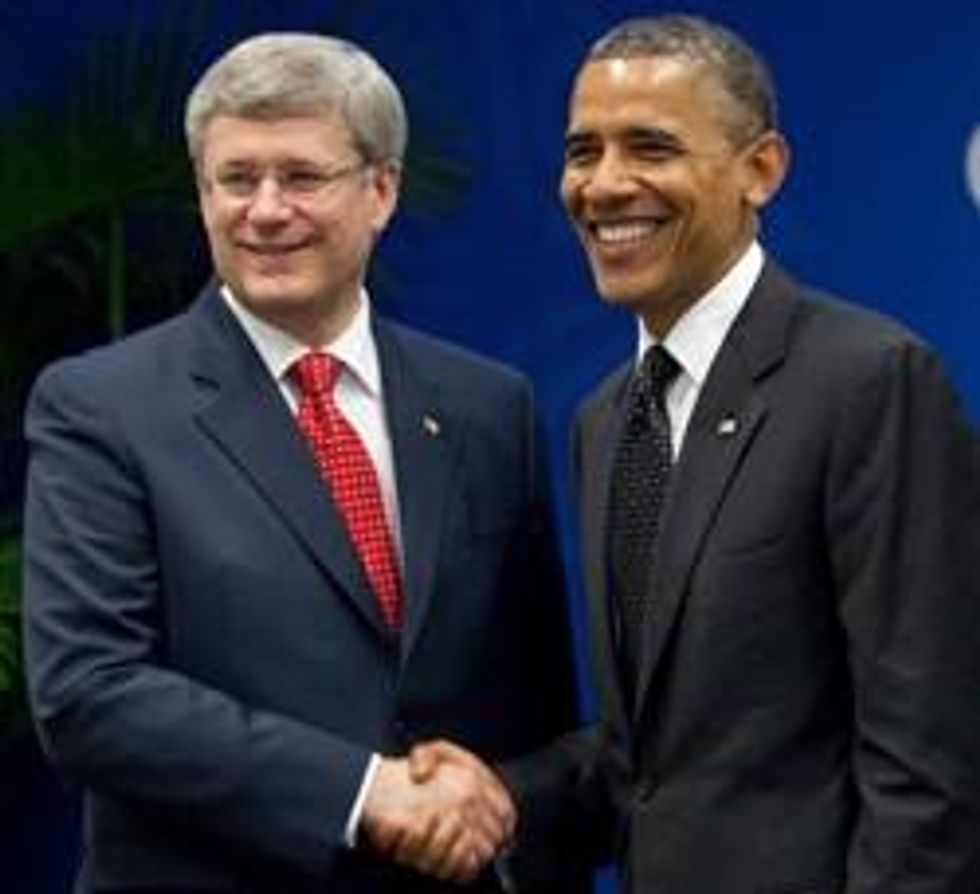The day before Detroit declared bankruptcy, I found The New York Times's Thomas Friedman up to his old tricks, extolling the North American Free Trade Agreement and "free trade" in general in a column so foolish and mendacious that his editors would have been well advised to spike it.
There's no coincidence, I'm sure, that Detroit -- the symbol and former center of American industrial power -- officially threw in the towel so close to publication of Friedman's claptrap. But the timing is worth noting as President Obama is now about to give away big chunks of the remaining U.S. manufacturing base to Japan and Vietnam, among other Pacific Rim countries, through a proposed free-trade agreement called the Trans-Pacific Partnership.
For decades, Friedman has been one of the principal cheerleaders for a tariff-free world in which only good things happen to workers while unregulated, speculative money races around the globe in search of the highest rate of return. Obama, though not a true believer like Friedman, is a political cynic about trade policy. During his 2008 primary race, he bludgeoned Hillary Clinton for Bill's sponsorship of
NAFTA, saying that "one million jobs have been lost because of NAFTA, including 50,000 jobs here in Ohio." His pledge to "renegotiate" the pact evaporated, however, once he entered the White House and appointed free trader Larry Summers his chief economic adviser.
Essentially, Obama and Friedman are comrades in arms, advancing an economic theory that should have been discredited long ago, but which continues to speed the exit of tens of thousands of decent-paying jobs to cheap-labor regions where there is little or no worker protection and only a facade of environmental regulation.
How does Friedman get away with it? Sometimes he likes to play reporter, such as the time he traveled to Sri Lanka to describe the allegedly wonderful working conditions in a Victoria's Secret factory. At other times he is more high-brow: In his July 17 column headlined "If Churchill Could See Us Now," for instance, he blasted the Republicans for holding up Obama's immigration-reform bill, but his twisted logic somehow turned the issue of legalizing long-term Latino residents into an advertisement for "free trade."
Republican House members, it seems, are responding to the "fears" of addled "older white people" who think that illegally implanted foreigners are stealing their jobs. This is a neat bit of sophistry by Friedman, since the illegals are mostly working below minimum wage in jobs that couldn't be filled by American citizens. The real fear among the oldsters is that the local factory will shut down and move to Mexico or China, leaving them unemployed or working in a Walmart for $9 an hour.
Older white people are obviously very shortsighted! Friedman instructs us that "we have already derived great economic benefit through [NAFTA] . . . And, if we were thinking strategically, one of our top priorities would be to further integrate North America." And how do we know this? Because the National Bureau of Economic Research tells us "that out of every $1of Mexican exports to the U.S., 40 cents comes from materials and parts made in the U.S.
True or not, it's useful to know that NBER is funded by the likes of Bank of America, Dupont Capital Management, Goldman Sachs, J.P. Morgan Chase and Morgan Stanley, all promoters and beneficiaries of globalization, cheap labor and low tariffs. According to Friedman, it's not the relocation from New York to Mexico, and then China, of Swingline Staplers or the move of Autolite sparkplugs from Fostoria, Ohio, to Mexico that should worry Americans.
Nor should we be troubled by the recent Associated Press investigation that found this startling statistic: "Four out of 5 U.S. adults struggle with joblessness, near-poverty or reliance on welfare for at least part of their lives" because of "an increasingly globalized economy, the widening gap between rich and poor, and the loss of good-paying manufacturing jobs."
Friedman, though, says we need to go farther down the shining path of deregulation and "integration" in order "to enhance such a win-win growth strategy that would incentivize more Mexicans to stay home."
That's more sophistry, since the free-trader Obama is already "incentivizing" such stay-at-home behavior by deporting illegal-alien Mexicans and their U.S.-born children at a record rate. Even the deeply muddled Friedman must know that many of these illegals are desperate former field hands driven off small Mexican corn farms that can't compete with industrialized American ones. Thanks to NAFTA, corn-producing behemoths in Nebraska no longer have to pay any tariffs at all on their exports south of the border.
You'd think that there was a professional politician smarter than Ross Perot, and more sophisticated than a Tea Partier, who could have a field day with the self-defeating contradictions and downright cruelty of the Friedman-Obama axis. I had hopes for Sen. Sherrod Brown (D-Ohio), but this usually clearheaded critic of the 'free-trade" theocracy has lately been wavering. In June he voted to confirm Obama's new trade representative, Michael Froman, a disciple of the ultra trade deregulator Robert Rubin and a former executive at Citigroup. Maybe Brown, like Obama before him, yearns to be president and frets about how much it will cost to run. If he starts raising big money from Wall Street, I hope that he realizes that there's no turning back.




